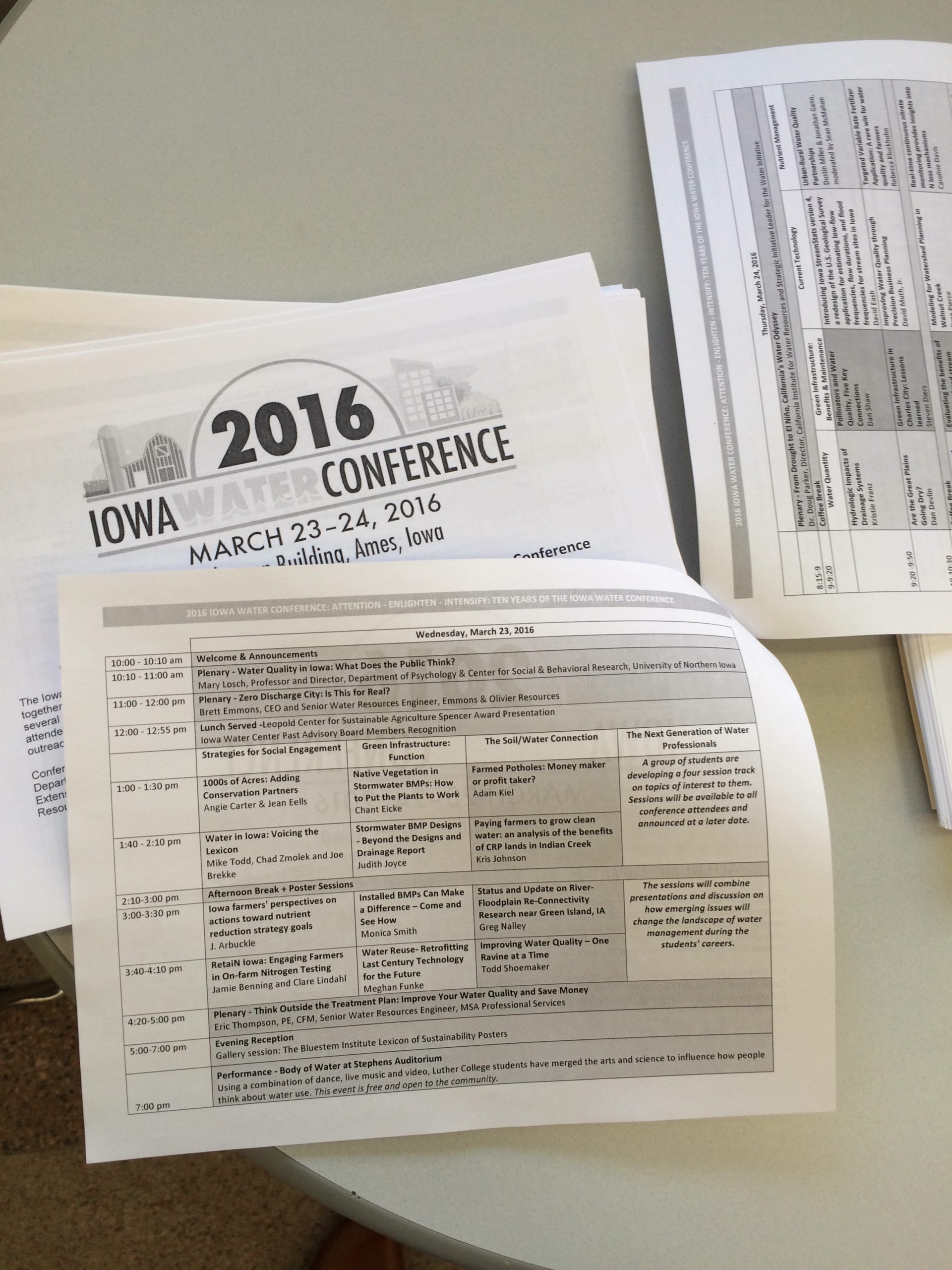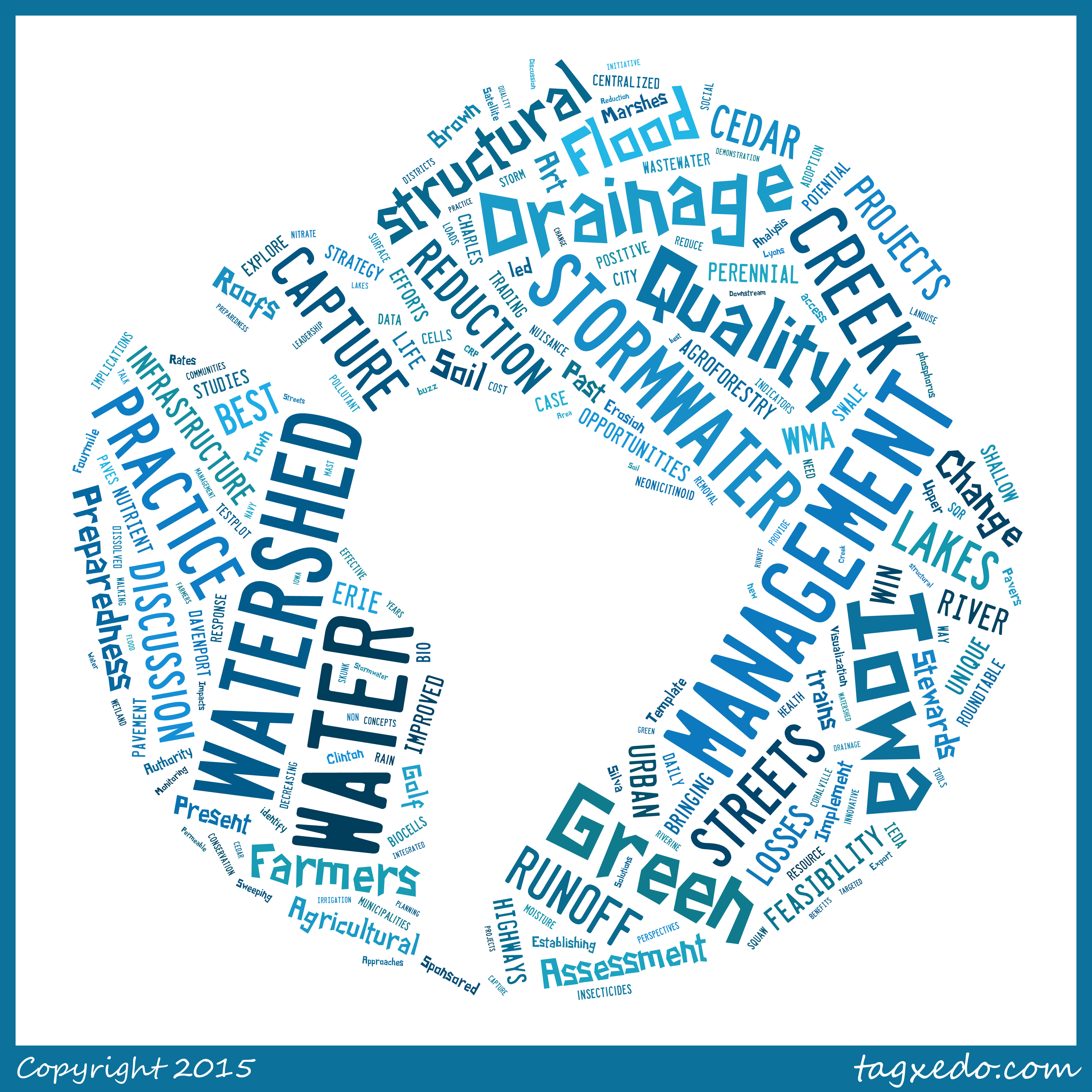On the first [business] day of Christmas, the Iowa Water Center gave to me…descriptions for Wednesday’s plenaries.
The following plenary sessions will be presented on March 23, 2016 at the Iowa Water Conference in Ames. Registration for the conference will open in January.
Water Quality in Iowa: What Does the Public Think?
Mary Losch, Professor & Director, Dept of Psychology & Center for Social & Behavioral Research, University of Northern Iowa
Issues of water quality are central to both the physical and the economic well-being of communities and states. Understanding the public’s knowledge of water quality and values placed on various dimensions of water quality is crucial to designing strategies to support evidence-informed decision-making about the issue. This presentation will describe a large statewide quantitative survey designed and conducted by the Center for Social and Behavioral Research at the University of Northern Iowa for the Iowa Department of Natural Resources. Beginning in February and concluding in early June 2015, more than 2000 adult Iowans were interviewed via telephone (both landline and cell phones) about their knowledge of and attitudes about water quality in the state. Computer-assisted telephone interviewing (CATI) was used to collect data from a sample of adults in Iowa identified through random-digit dialing (RDD). Interview questions addressed 1) environmental literacy and general views on the environment; 2) understanding of water quality and causes of water pollution; 3) participation in recreational activities and/or employment involving water; 4) positive and negative environmental behaviors that could impact water quality; 5) views about and awareness of strategies for improving water quality; 6) perceptions of responsibility for improving water quality and willingness to pay (WTP) or invest in water quality improvement; and, 7) factors (e.g., demographic, sense of place, information sources) that could impact the knowledge, attitudes and perceptions assessed. Key findings from the survey will be presented and discussed.
———————–
Zero Discharge City: Is this Real?
Brett Emmons, Sr. Water Resources Engineer, CEO, Emmons & Olivier Resources, EOR
Stormwater management in an over 3,000-acre, hydrologically land locked area in the City of Inver Grove Heights, MN became an obstacle for the community’s growth. The traditional stormwater management approach proved to be cost prohibitive. Driven by cost and impact concerns to the surrounding Marcott Lakes and Mississippi River, the City explored a new approach of strict, zero stormwater runoff discharge policy for all development in the area.
The paradigm shift from the traditional ‘pipe-and-pump’ to an enhanced low impact development (LID) approach was recognized as a new national trend with a 2015 National Excellence in Engineering Award. The enhanced LID-system significantly reduced the area’s initial infrastructure capital cost by $18 million and reduced lifecycle costs. “Argenta Hills”, one of the first developments in the area, proved to be very challenging. It included a large commercial retail and an extensive single family residential development. EOR took advantage of the site’s natural topography by maintaining its regional depressions, mimicking natural hydrology. Infiltration was maximized by strategically locating an extensive “Treatment Train System” of: raingardens, porous pavement areas, pervious paver intersections, vegetated swales, infiltration basins and stormwater harvesting. Not only did this approach reduce cost, it also helped in retaining some of the site’s unique natural characteristics and add amenities.
These new, creative approaches introduced by EOR, generated a new framework and opportunity for the cities to use this first-of-its-kind in the country approach to accomplish water quality and flood control protection.
————————-
Think Outside the Treatment Plant to Improve Your Water Quality and Save Money
Eric Thompson, PE, CFM, Senior Water Resources Engineer, MSA Professional Services, Inc.
The City of Lodi, Wisconsin, received a future phosphorus limit of 0.075 mg/L for its wastewater treatment facility. Costs for upgrading the treatment facility to meet the new limit were compared to the anticipated costs of two new watershed-based compliance approaches called Adaptive Management and Nutrient Trading.
Adaptive Management requires that phosphorus loads in the watershed be reduced to the extent that the receiving stream attains the applicable water quality criterion within 20 years, while enabling the treatment facility to maintain a discharge of 0.5 mg/L phosphorus. Nutrient Trading is similar in that it allows reduction of phosphorus in the watershed. However, it does not require compliance to be measured within the stream. The trade-off for this is that nutrient trades must be made at a ratio higher than 1:1 making nutrient trading a safer, but perhaps more costly alternative.
The City of Lodi has prepared a preliminary assessment of alternatives to meet its future phosphorus limit and Adaptive Management would cost roughly half the cost of upgrading the facility. This presentation discusses the development and implementation of the City’s Adaptive Management Project. Elements included assessment of plant operations, sampling for water quality within the receiving stream, and modeling of urban, rural, and farmstead landscapes to determine phosphorus loads. The project also prioritized alternative management practices to reduce phosphorus in the watershed sufficient to achieve permit requirements for the treatment facility.

